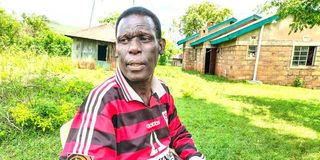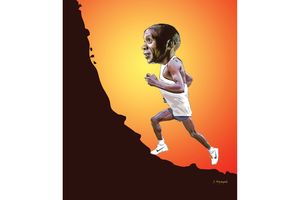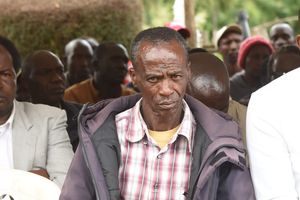
Former Kenyan Olympian Samson Oriso, who competed in the 1988 Seoul Games, now lives in poverty after suffering heartbreak, depression and losing his leg in an accident in 2023.
A prominent member of Team Kenya in the 1980s, Samson Ochieng’ Oriso was part of the Kenyan team that went to the 1988 Seoul Olympics and finished 12th.
He was probably on the same flight home from Seoul as Robert Wangila, the first African boxer to win an Olympic gold medal, and John Ngugi, who won gold in the men's 5000m at the Games.
Now 60, Oriso should be enjoying his retirement, perhaps mentoring young talent or simply living the quiet, easy life of a senior citizen. But the former Kenyan international can barely walk and spends most of his time sitting in his rural home in Suba South, Homa Bay County, a shadow of the man who once carried the country's hopes on the world hockey stage.
Born in Homa Bay and raised in Kisumu, Oriso picked up his first hockey stick in the mid-1970s while at Aga Khan Primary School in Kisumu. By 1979, he was one of Aga Khan Primary's top players, leading them to victory in the Kisumu District Inter-Schools Hockey Championship.
"When I joined Kisumu Boys High School in 1981, my dream was to play at the highest level. In 1984, I helped the school win its 11th consecutive national title," recalls Oriso with a faint smile on his face.

"When I was at Kisumu Boys, I was able to train with the senior hockey players at Kisumu Simba Club. The club recognised my talent and included me in their squad. He remembers playing with the likes of Parminder Singh Saini, Lucas Alubaha, Eliud Okoth and Emanuel Oduor.
Oriso credits his mother, Jane Bolo, with being a major influence on his early hockey career. He fondly recalls how she supported his passion by buying him his first brand new jersey when he joined Kisumu Simba Hockey Club.
As a Form Four player, he was selected for the Kenya junior team that toured Morocco, Tunisia and Malawi in 1984.
"Oriso was fast, skilled and passionate. It wasn't long before he was called up to the senior national team," says Philip Oyoo, who joined Oriso at Kisumu Boys High School in 1981.
Oriso represented Kenya at the 1988 Summer Olympics at the age of 23. "We trained in Russia and England before the Games. When I saw my name in the Daily Nation as part of the final Olympic squad, I couldn't believe it. I rushed back to Kisumu to tell my family the news," Oriso recalls.
Oriso admits that earning a place in the national team was anything but easy. As the youngest player in the squad, he had to prove himself against more experienced athletes.
"The first seven places were reserved for automatic selections, so the rest of us had to fight hard for the remaining places. But I thank God I got the call to join the first team - it was a dream come true. I could play at number seven or eight," he recalls.
Kenya's Olympic squad includes the likes of Ranjeev Deol, Michael Omondi, Peter Akatsa, Chris Otambo, Paul Omany and Lucas Alubaha. But as fast as the glory came, so did the downfall - and it wasn't on the pitch. Oriso became involved with a woman while playing for Simba Hockey Club in 1982. They started living together.
"After seven years, we got engaged and I thought we would build a life together, but that was never to be. We even had a child together," he says, his voice dropping. "But things fell apart. I was cheated out of that relationship. The betrayal cut deep - emotionally and professionally".
Disillusioned, he quit his odd job at the Lake Basin Development Authority in Kisumu.
Read: Rotterdam Marathon: We’ll run race of our lives in honour of Kelvin Kiptum, says Kenneth Kipkemoi

Samson Ochieng, 60, popularly known as Sam Oriso, during an interview at their home in Suba South, Homa Bay County on April 17, 2025.
Heartbreak
The heartbreak sent him into a spiral of depression that led him back to his village in South Suba, where he turned to farming.
"I lost my sense of purpose. The emotional toll was greater than I expected. And to this day, the scar hasn't healed," he says.
He became a heavy drinker. In fact, it was because of his drinking problem that a second woman, with whom he had settled down and even had two children, left him.
As if fate had not dealt him enough blows, tragedy struck again in July 2023 when he was involved in a car accident in Homa Bay. What initially appeared to be a minor injury to his left leg turned into a serious medical emergency.
"I thought it was something that would heal. But when I went for a check-up at Homa Bay County Referral Hospital, the doctors told me that my leg would have to be amputated because it was badly infected," he says.
On 17 July 2023, he lost his leg - and with it, another hockey dream.
"I had this dream of coaching young players, helping them experience what I did - travelling, representing Kenya. That dream was suddenly snatched away," he laments.
But even as he sits in a plastic chair on the veranda of his modest home, Oriso refuses to give up.
"I still have the knowledge. I can still train. I can still teach hockey to young people. All I need is a chance - and support.
Forgotten giant
Despite his achievements, Oriso, who still struggles with alcoholism and depression, lives in obscurity with his elderly mother. With no steady income and little public recognition, he now relies on the kindness of well-wishers.
"It is heartbreaking. This is someone who put Kenya on the international map. He should be celebrated, not forgotten, this is the time to celebrate Oriso for the glory he brought to the nation and the hockey fraternity," says Oyoo.
For Oriso, hockey remains the greatest gift life has given him.
"Every day I will choose hockey over football, basketball or anything else. I have seen the world through hockey. The little recognition I have now is because of hockey.
He hopes that Kenyan hockey will be revived and that former players like him will be remembered not just for their glory days, but for the battles they fought off the field.
"I may not have my leg, but I have my story. I have my heart, I'm still a coach at heart - I just need someone to believe in me again.

Samson Ochieng, 60, popularly known as Sam Oriso, during an interview at their home in Suba South, Homa Bay County on April 17, 2025.
"We should bring hockey back to where it used to be, and the time is now," says Oriso.
Counselling psychologist Loice Noo-Okello says such emotional trauma can have serious, long-lasting effects.
"Any relationship break-up is traumatic. It is not only physical, but also emotional," she explains.
"When such a break-up happens, the person goes into a state of traumatic loss. If left untreated, it can develop into post-traumatic stress, which often leads to depression," she tells Nation Sport in an interview.
She adds that in many cases, people experiencing such emotional distress may turn to harmful coping mechanisms.
"At this point, the person becomes overwhelmed and may channel their pain into anger. They often find temporary relief in things like substance abuse," she says.
"They may believe that drugs or alcohol will help them cope, but these only mask the pain and delay healing. Without psychological support, many lose touch with reality and drift into self-destructive behaviours that damage their health, careers and relationships," she adds.
Noo-Okello notes that people over 50 often face more severe mental health problems when dealing with emotional trauma than younger people in their 20s.
"At 50 and over, many people begin to reflect deeply on their past and the opportunities they feel they've lost. When they're hit by such emotional pain, there's a heightened sense of hopelessness," she explains.
"Unlike younger people who see time ahead to rebuild, older adults may feel that their lives have already unravelled.
In such cases, conventional psychotherapy may not be effective in the early stages. They often need more structured, intensive care, such as admission to a rehabilitation centre, to stabilise them emotionally and psychologically," she explains.






